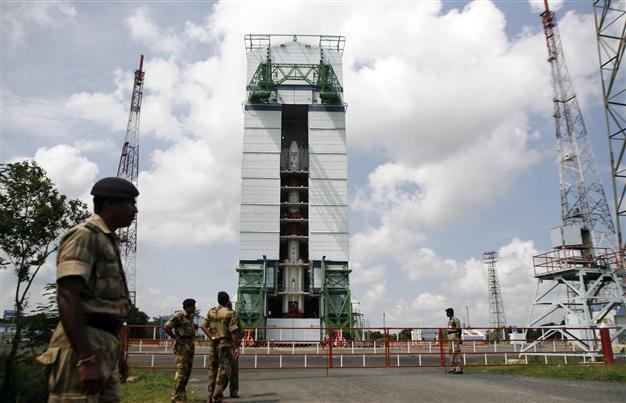Indian space head braced for tricky Mars challenge
NEW DELHI - Agence France-Presse

Paramilitary soldiers stand guard near the Polar Satellite Launch Vehicle (PSLV-C25) at the Satish Dhawan Space Center at Sriharikota, in the southern Indian state of Andhra Pradesh, Wednesday, Oct. 30 ,2013. AP Photo
The head of India's space agency warned Thursday of the immense complexity of sending a mission to Mars as the country prepares to send its first interplanetary probe to explore the atmosphere there."As we can see for Mars there were 51 missions so far the world around and there were 21 successful missions," K. Radhakrishnan told AFP in an interview. "It's a complex mission." The 1.3-tonne Mars Orbiter probe will begin a 300-day mission next Tuesday when it is launched aboard a rocket from the Sriharikota space station on the Bay of Bengal.
Radhakrishnan, chairman of the Indian Space Research Organisation (ISRO), denied any last-minute nerves about the 4.5 billion rupee ($73 million) project, but said his scientists had a tiny margin for error.
"In space, we should not worry about success or failure. The difference between success and failure in space is very, very thin," he said.
"But do the job well and do the best. And if it is a failure, then learn. Failure is a stepping stone for success," he added, fresh from a meeting to brief Prime Minister Manmohan Singh on preparations.
A rehearsal of the computer systems which will launch and then control the probe was successfully conducted on Thursday, he said, and the final countdown will begin on Sunday morning.
Radhakrishnan said the mission was another "turning point" for India's space ambitions after it successfully placed an unmanned probe on the Moon in 2008 in a triumph that is a source of national pride.
A handful of countries have launched missions to Mars, including the United States, Russia, Japan, the European Union and India's main regional rival China, which failed in 2011.
Radhakrishnan denied there was any competition with Beijing, which has already put an astronaut into space, something that India is still only in the initial stages of exploring.
"We are in competition with ourselves in the areas that we have charted for ourselves," he said. "Each country has its own priorities." The purpose of the Indian mission is to prove the country's capabilities in rocket technology and collect details about the presence of methane in the Mars atmosphere.
If they detect the gas, they will hope to determine whether it originates from geological or biological activity. In the case of the latter, it would add weight to the idea of the Red Planet supporting some sort of primitive life form.
NASA is set to launch its own Mars mission less than two weeks after India on November 18.
The Maven probe aims to find out why the Red Planet lost much of its atmosphere.
















